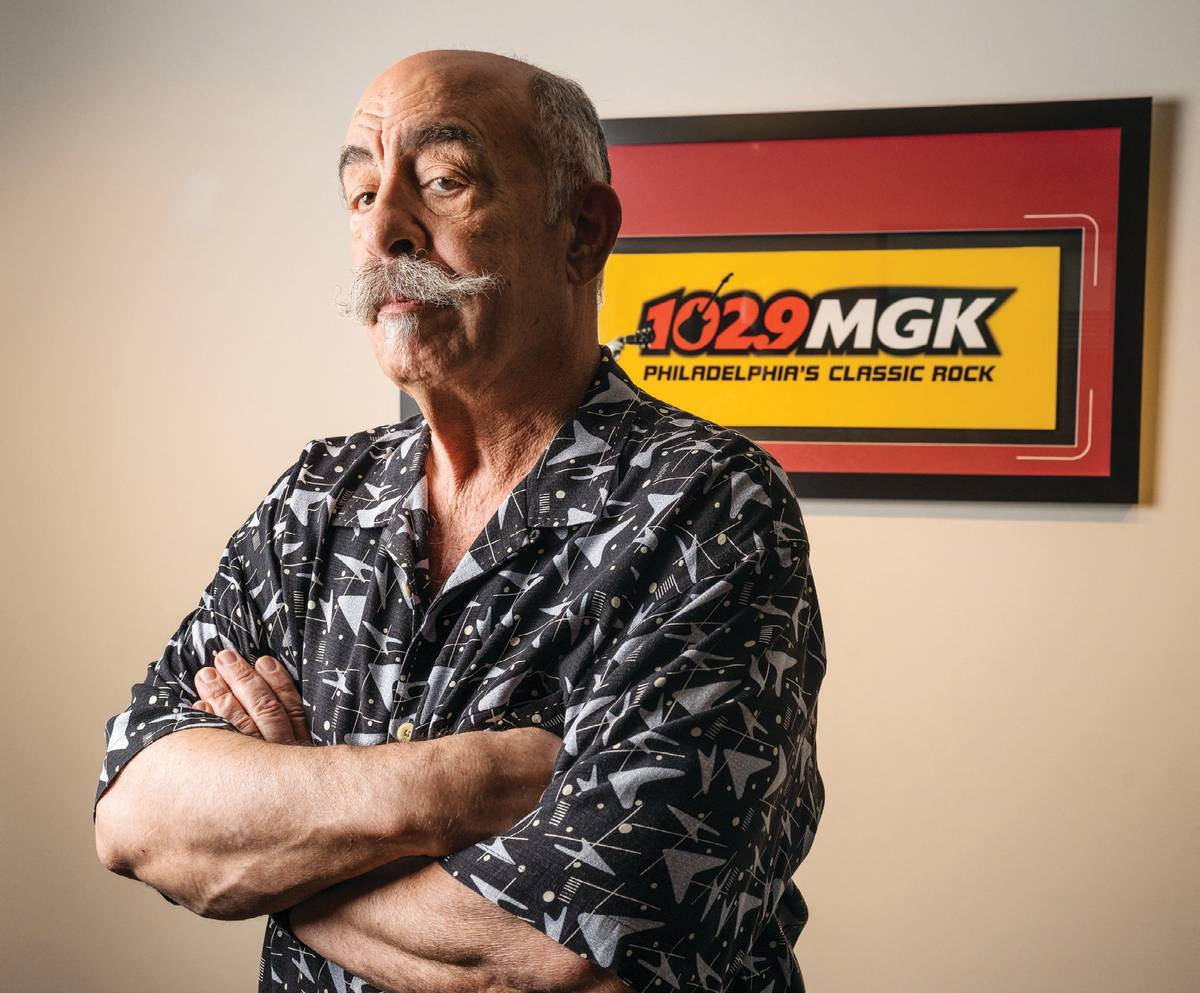John DeBella, a name synonymous with Philadelphia radio, recently concluded his illustrious career, marking the end of an era for the city’s airwaves. After nearly half a century of entertaining listeners, DeBella’s departure from Beasley’s WMGK signals not just a personal transition to more family time, but also a moment to reflect on a remarkable journey. His career, punctuated by both soaring highs and challenging lows, embodies a spirit of resilience, perfectly encapsulated by his long-time theme song, “Always Look on the Bright Side of Life.” This Monty Python classic isn’t just a catchy tune for DeBella; it’s a philosophy that mirrors his approach to a dynamic and often turbulent industry.
 john debella photo mainline
john debella photo mainline
DeBella’s connection with his audience was profound. As someone deeply embedded in the Philadelphia community, he cultivated a relationship with millions. Ask any Philadelphian, and they’re likely to share a DeBella anecdote, a testament to his pervasive influence and enduring appeal. This wasn’t just about being a voice on the radio; it was about creating a shared experience, a daily connection that resonated with the city’s rhythm.
Fred Jacobs, in his tribute to DeBella, highlights this unique bond and reflects on the lessons learned from the radio veteran. Jacobs, a respected figure in the radio industry himself, recounts his professional interactions with DeBella, underscoring the invaluable insights gained from observing DeBella’s career trajectory. Their paths intertwined significantly during a pivotal period in Philadelphia radio history – the rise of Howard Stern in the market.
The mid-1980s saw WYSP, under the guidance of GM Ken Stevens and PD Andy Bloom, adopting a Classic Rock format. In a bold move to shake up the landscape, they decided to syndicate Howard Stern from New York’s WXRK. Jacobs, then involved in the Classic Rock format’s burgeoning popularity, vividly recalls a dinner with Stevens and Bloom, where he expressed reservations about the new direction of WYSP. Stevens’ response, acknowledging the low ratings bar, set the stage for a challenging, yet ultimately transformative, period.
While WYSP’s music programming was solid and Stern’s shock-jock style was undeniably attention-grabbing, Philadelphia initially remained unconvinced. Stern’s abrasive style was perceived as foreign to the local sensibility, and the music alone wasn’t enough to sway loyal listeners. The formidable presence of WMMR, a radio behemoth in Philadelphia, further complicated matters. WMMR boasted a stellar lineup of personalities and, crucially, “The Morning Zoo” hosted by John DeBella. This show was a cultural phenomenon, deeply ingrained in the daily lives of Philadelphians, celebrated for its local flavor, engaging characters, and DeBella’s masterful hosting. Features like “Hawaiian Shirt Friday” and “Hump Day Wednesday” weren’t just gimmicks; they were threads in the fabric of the community DeBella had woven around his show.
Focus groups revealed the uphill battle WYSP faced. WMMR was not just a competitor; it was an institution. WYSP was seen as a pale imitation, and importing a controversial New York morning show to challenge a beloved local icon like DeBella seemed like an improbable strategy. However, Howard Stern, known for his relentless ambition, saw DeBella and “The Morning Zoo” as the prime target.
Stern launched a full-frontal assault on WMMR’s morning show, relentlessly mocking “The Morning Zoo” concept and singling out DeBella for daily ridicule. He branded DeBella and his show as outdated and irrelevant, employing tactics reminiscent of later political branding strategies, labeling DeBella with nicknames and casting him as the outdated “zookeeper.” This aggressive approach began to chip away at WMMR’s dominance. Stern’s relentless attacks, combined with WMMR’s initial reluctance to engage, started to shift public perception. DeBella, as the face of the targeted show, bore the brunt of this onslaught, witnessing a decline in both public image and ratings.
Jacobs, observing from the opposing side, acknowledges the immense personal toll this must have taken on DeBella. While MMR initially attempted to ignore Stern’s attacks, the constant barrage and the public harassment from Stern’s growing fanbase were inescapable. This culminated in the infamous “DeBella Funeral,” a Stern-organized rally held in front of WMMR’s location, attracting significant media attention and solidifying Stern’s victory in this radio war. For DeBella, it was a public and painful defeat.
While Stern’s career ascended to new heights, DeBella eventually left WMMR. The station, despite efforts to replicate the “Morning Zoo” magic, struggled to regain its footing until Preston & Steve revitalized their morning programming. However, DeBella’s story takes a remarkable turn.
In the 1990s, WYSP, ironically the station that had once been instrumental in his professional setback, offered DeBella an afternoon slot. Tim Sabean, then programming at WYSP, orchestrated a seemingly impossible reconciliation between Stern and DeBella. In an on-air exchange, the two personalities publicly “made peace.” While perhaps not entirely genuine, this truce paved the way for DeBella’s successful afternoon run on WYSP, under the very shadow of his former adversary’s morning dominance.
Jacobs marvels at DeBella’s ability to rebound from such a deeply personal and public career hit. This period reveals a lesser-discussed facet of DeBella’s character: his extraordinary resilience, unwavering determination, and inherent class. Many in the radio industry, Jacobs included, might have struggled to recover from such a professional and personal blow.
DeBella’s career resurgence continued when he joined WMGK, taking over mornings under the guidance of Buzz Knight. Here, he replicated his success, once again demonstrating his tireless work ethic and deep connection with his audience. Consistent with his “Morning Zoo” days, DeBella integrated community events and charitable initiatives into his show at MGK, including the Radiothon for veterans, the Turkey Drop, DeBella’s DeBall, and the Dog Walk, even adapting during the COVID-19 pandemic.
 john debella virtual dog walk
john debella virtual dog walk
DeBella’s legacy extends beyond ratings and market share. He taught valuable lessons about perseverance and maintaining composure amidst professional storms. Years after the “DeBella Funeral,” Stern himself acknowledged DeBella’s strength and resilience, offering a public apology. According to a City Life report in the Daily News, Stern admitted on his Sirius program, “You are a bigger man than I could ever be and, looking back, I’m ashamed of what I’ve done. You are one of the strongest human beings I have every encountered.”
This acknowledgment from Stern underscores the arc of DeBella’s career. His enduring theme song, “Always Look On The Bright Side of Life,” wasn’t just a playful jingle; it was a guiding principle. John DeBella’s career exemplifies resilience, adaptability, and the ability to find positivity even after facing significant adversity. For those still in the radio industry and beyond, DeBella’s journey serves as a powerful reminder of perseverance and grace under pressure. His story encourages us all to, indeed, always look on the bright side of life.
Based on the article by Fred Jacobs, President & Founder at Jacobs Media.

